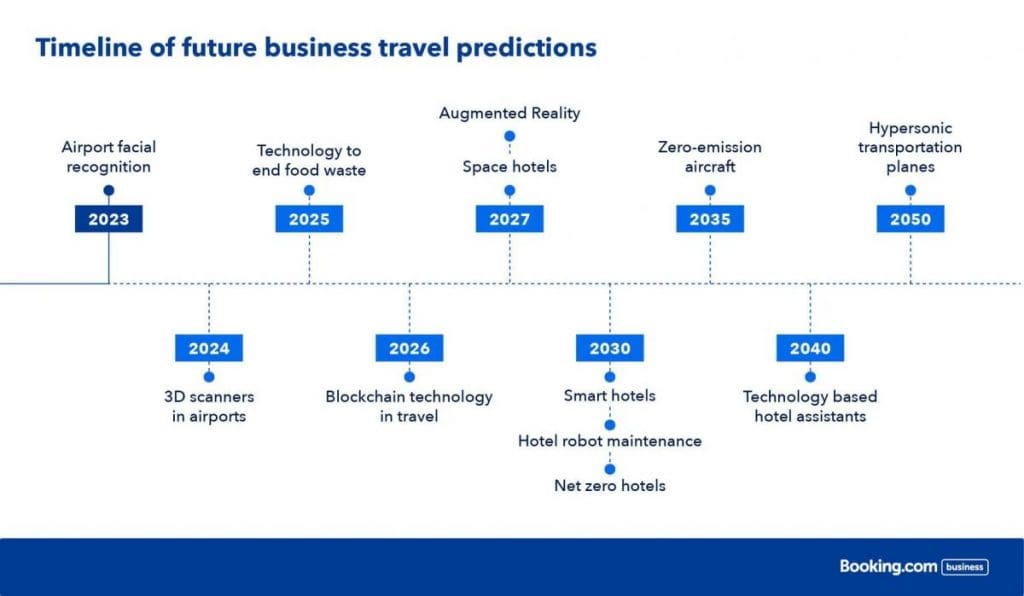The prospect of travel in the future is being reshaped by Booking.com, which predicts that NFTs will influence business sectors significantly by 2026.
In Brief
Booking.com for Business offers a glimpse into the forthcoming landscape of corporate travel, delving into how tech advancements will redefine modes of transport, lodging, and activities leading up to 2050.
Experts believe that by 2026, blockchain technology will have a profound influence on the travel sector, with innovations like NFTs for digital artwork, exclusive access passes, and airline tickets, enhancing traveler convenience, security, and personalization.
Hotels are increasingly turning to AI to combat food waste, showcased by Iberostar Group's ambition to eliminate landfill waste by 2025. This initiative employs data analysis to propose waste reduction techniques and foster eco-conscious travel choices.
By 2030, AI is expected to take guest comfort and energy efficiency in hotels to new heights, managing heating, cooling, and ventilation systems effectively while improving security through advanced methods such as facial recognition and biometric logins.
Augmented reality is on the brink of transforming the travel and workplace experience by 2027, providing business travelers with tools for navigation, language interpretation, virtual touring, and enhanced product displays.

The dynamics of business travel are shifting rapidly due to emerging technologies. What will the future hold regarding transportation, lodging, and activities? Booking.com for Business sheds light on the forthcoming trends that will dictate the evolution of business travel until 2050. data As outlined in Booking.com’s analysis, blockchain technology is set to become a cornerstone in the travel industry by 2026, with potential uses such as NFTs representing digital art, access passes, and airline tickets to streamline the traveler's experience with more security and personalization.

AI Innovations Forecast for Corporate Travel
Numerous hotels have adopted AI to address food waste issues, inspired by successful test projects. As highlighted by Booking.com, the Iberostar Group is leveraging technology to achieve its goal of being landfill-free by 2025. By meticulously tracking food stock and waste, they use data-driven recommendations to minimize waste, encouraging business travelers to choose more sustainable accommodation options.
Predictions indicate that by 2030, intelligent hotels will employ AI to maximize guest satisfaction and energy efficiency. This would involve regulating temperature and air flow systems to cut down operational costs, which could align with corporate sustainability objectives. Furthermore, AI will bolster security protocols using facial recognition, biometric access, and modern locking systems.
Virtual and Augmented Reality: The Future of Travel
The potential of augmented reality in transforming travel and work experiences is immense by 2027. AR tools could augment the journeys of business travelers by offering navigation assistance in unfamiliar locales and real-time translation of languages, alongside the ability to explore sites virtually or access additional information through digital overlays. Moreover, AR can enhance product demonstrations, allowing clients to interact with offerings in innovative ways.
In a previous survey by Booking.com, over 24,000 travelers from 32 different countries weighed in on how VR and the metaverse might shape their travel decisions in 2023. The feedback revealed that 43% of respondents intend to leverage VR for inspiration when selecting holiday spots, while 46% feel more inclined to embark on adventures after exploring destinations in the metaverse. Particularly, Asia emerges as the technological frontrunner in VR adoption, with countries like China, Thailand, and India leading the charge. Still, it’s worth noting that many travelers hold a preference for authentic travel experiences over virtual ones, expressing the desire to visit their dream destinations in person.
What transformations can the metaverse bring to travel experiences in 2023? Black Platinum Gold has introduced an NFT venture for luxury travel experiences. The influence of AI on the travel sector is profound.
Read more:
- Please remember that the information shared on this page is not intended as legal, tax, financial, or investment advice. Always invest responsibly and seek professional financial guidance if you're uncertain. We recommend reviewing the terms and conditions along with the support resources provided by the advertiser. While MetaversePost strives for accuracy and impartial reporting, conditions in the market can change rapidly.
- Agne is a dedicated journalist covering emerging trends within the metaverse, AI, and Web3 spheres for Metaverse Post. With a passion for narrative, she has interviewed numerous specialists to tell compelling stories. Agne earned her Bachelor's degree in literature and boasts a rich writing background that spans various themes, including travel, arts, and culture. She has also volunteered her editing skills for animal rights initiatives to raise awareness about welfare concerns. Feel free to reach out to her via
- A white hat hacker has identified a significant vulnerability in Scroll, while the co-founder defends the security of their protocol.
Disclaimer
In line with the Trust Project guidelines Crypto in April 2025: Key Trends, Developments, and What's Next on the Horizon.







